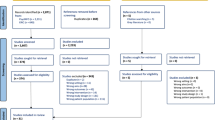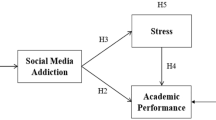Abstract
The present study intended to find out the associated variables of depression and anxiety symptoms for young adults confronted with an academic stress. Ninety-two graduate students, who were actively involved in preparing their thesis, participated in this study. Two regression analyses were conducted to see different variables associated with depression and anxiety symptoms separately. Consistent with the expectations, depression and anxiety had overlapping predictors, such as negative automatic thoughts and hopelessness. However, adequacy of problem-solving abilities seemed to be associated with anxiety symptoms. Findings were discussed in the light of relevant literature.
Similar content being viewed by others
References
Alford, B.A., Lester, J.M., Patel, R.J., Buchanan, J.P., & Giunta, L.C. (1995). Hopelessness predicts future depression symptoms: A prospective analysis of cognitive vulnerability and cognitive content specificity. Journal of Clinical Psychology, 57(3), 331–339.
Aydm, G., & Ayam, O. (1988). Otomatik Düşünceler Ölçeginin geçerlik ve güvenirligi [The reliability and validity of the Automatic Thought Questionnaire]. Psikoloji Dergisi, 7, 51–55.
Beck, A.T., Rush, A.J., Shaw, B.F., & Emery, G. (1979). Cognitive therapy of depression. New York: Guilford Press.
Beck, A.T., Weissman, A., Lester, D., & Trexler, L. (1974). The measurement of pessimism: The hopelessness scale. Journal of Consulting and Clinical Psychology, 42, 861–865.
Billings, A.G., & Moos, R.H. (1982). Psychosocial theory and research on depression: An integrative framework and review. Clinical Psychology Review, 2, 213–237.
Brown, G. W., & Harris, T.O. (1989). Depression. In G. W. Harris, & T. O. Harris (Eds.), Life events and illness (pp. 43–93). New York: Guilford Press.
Burns, D.D., & Eidelson, R.J. (1998). Why are depression and anxiety correlated? A test of the tripartite model. Journal of Consulting and Clinical Psychology, 66 (3), 461–473.
Ciarrochi, J., Scott, G., Deane, F.P., & Heaven, P.C.L. (2003). Relations between social and emotional competence and mental health: a construct validation study. Personality and Individual Differences, 35, 1947–1963.
Clark, D.A., Steer, R.A., & Beck, A.T. (1994). Common and specific dimensions of self-reported anxiety and depression: Implications for the cognitive and tripartite models. Journal of Abnormal Psychology, 103 (4), 645–654.
Dixon, W.A., Heppner, P.P., & Anderson, W.P. (1991). Problem-solving appraisal, stress, hopelessness, and suicide ideation in a college population. Journal of Counseling Psychology,38 (1), 51–56.
Dixon, W.A., Heppner, P.P., Burnett, J.W., Anderson, W.P., & Wood, P.K. (1993). Distinguishing among antecedents, concomitants, and consequences of problem-solving appraisal and depression symptoms. Journal of Counseling Psychology, 40 (3), 357–364.
Durak, A. (1993). Beck Umutsuzluk Öçegi’nin geçerligi üzerine birçalişma [A study on the validity of the Beck Hopelessness Scale]. Unpublished master’s thesis, Ankara University, Ankara.
Durak, A. (1994). Beck Umutsuzluk Ölçegi’nin geçerlik ve güvenirlik çalişması. Türk Psikoloji Dergisi 9 (31), 1–11.
D’Zurilla, T.J., Chang, B.C., Nottingham, E.J., & Faccini, L. (1998). Social problem-solving deficits and hopelessness, depression, and suicidal risk in college students and psychiatric inpatients. Journal of Clinical Psychology, 54 (8), 1091–1107.
Farmer, R.F. (1998). Depression symptoms as a function of trait anxiety and impulsivity. Journal of Clinical Psychology, 54 (2), 129–135.
Göregenli, M. (1997). Individualist-collectivist tendencies in a Turkish sample. Journal of Cross-Cultural Psychology, 28 (6), 787–794.
Gottlib, I. (1984). Depression and general psychopathology in university students. Journal of Abnormal Psychology, 93, 19–30.
Heppner, P.P., & Anderson, W.P. (1985). The relationship between problem solving self-appraisal and psychological adjustment. Cognitive Therapy and Research, 9, 415–427.
Heppner, P.P., & Petersen, C.H. (1982). The development and implications of a personal problem-solving inventory. Journal of Counselling Psychology, 29, 66–75.
Heppner, P.P., Reeder, B.L., & Larson, L.M. (1983). Cognitive variables associated with personal problem-solving appraisal: Implications for counseling. Journal of Counseling Psychology, 30, 537–545.
Hisli, N. (1988). Beck Depresyon Envanterinin geçerligi üzerine bir çalişma [A study on the validity of Beck Depression Inventory]. Psikoloji Dergisi, 6, 118–122.
Hisli, N. (1989). Beck Depresyon Envanterinin universite ögrencileri için geçerligi ve güvenirligi [Reliability and validity of Beck Depression Inventory for university students]. Psikoloji Dergisi, 7, 3–13.
Hollon, S.D., & Kendall, P.C. (1980). Cognitive self-statements in depression: Development of an Automatic Thoughts Questionnaire. Cognitive Therapy and Research, 4, 383–395.
Kagitçibaşi, Ç. (1987). Individual and group loyalties: Are they compatible? In Ç. Kagitçibaşi, (Ed.), Growth and progress in cross-cultural psychology (pp. 94–104). Lisse, Netherland: Swets and Zeitlinger.
Korobkin, S., Herron, W., & Ramirez, S. (1998). Severity of symptoms of depression and anxiety as predictors of duration of psychotherapy. Psychological Reports, 82, 427–433.
Nezu, A.M. (1985). Differences in psychological distress between effective and ineffective problem solvers. Journal of Counseling Psychology, 32 (1), 135–138.
Nezu, A.M. (1986). Cognitive appraisal of problem solving effectiveness: Relation to depression and depression symptoms. Journal of Clinical Psychology, 42 (1), 42–48.
Nezu, A.M., & Ronan, G.F. (1985). Life stress, current problems, problem solving, and depression symptoms: An integrative model. Journal of Consulting and Clinical Psychology, 53 (5), 693–697.
Nezu, A.M., & Ronan, G.F. (1988). Social problem solving as a moderator of stress-related depression symptoms: A prospective analysis. Journal of Counseling Psychology, 35 (2), 134–138.
Öner, N. (1977). Durumluluk-Süirekli Kaygı Envanteri’nin Türk Toplumunda Geçerligi [The validity of State-Trait Anxiety Inventory in Turkish sample]. Unpublished dissertation, Hacettepe University, Ankara.
Özbilgin, M. & Healy, G. (in press). The gendered nature of career development of university professors: The case of Turkey. Journal of Vocational Behavior.
:Ozgüiç, N. (1998). Tüirkiye Üniversitelerinde Kadın Cografyacilar. In N. Arat (Ed.), Aydınlanmanın Kadınları (pp. 177–201). Istanbul: Cumhuriyet Kitap Kulübü.
Peker, M. (1996). Internal migration and the marginal sector. In E. Kahveci, N. Sugur, & T. Nichols (Eds.), Work and occupation in modern Turkey (pp. 7–37). London: Mansell.
Sahin, N. H., & Sahin, N. (1992). Reliability and validity of the Turkish version of the Automatic Thoughts Questionnaire. Journal of Clinical Psychology, 48 (3), 335–340.
Sahin, N., Sahin, N.H., & Heppner, P.P. (1993). Psychometric properties of the problem solving inventory in a group of Turkish university students. Cognitive Therapy and Research, 17 (4), 379–396.
Schotte, D.E., & Clum, G.A. (1982). Suicide ideation in a college population: A test of a model. Journal of Consulting and Clinical Psychology, 50, 690–696.
Schotte, D.E., & Clum, G.A. (1987). Problem-solving skills in suicidal psychiatric patients. Journal of Consulting and Clinical Psychology, 55 (1), 49–54.
Seber, G. (1991). Beck Umutsuzluk Ölçegi ’nin geçerlik ve güivenirligi üizerine bir çaliµa [A study on the validity and reliability of the Beck Hopelessness Scale]. Unpublished dissertation, Ankara University, Ankara.
Seber, G., Dilbaz, N., Kaptanoglu, C., & Tekin, D. (1993). Ümitsizlik Ölçegi: Geçerlik güvenirlik. Kriz Dergisi, 1 (3), 134–138.
Spielberger, C., Gorsuch, R., & Lushene, R. (1970). Manual for the State-Trait Anxiety Self-Evaluation Questionnaire. Palo Alto, CA: Consulting Psychologists Press.
Swendsen, J.D. (1997). Anxiety, depression, and their comorbidity: An experience sampling test of the helplessness-hopelessness theory. Cognitive Therapy and Research, 21 (1), 97–114.
Tegin, B. (1980). Depresyonda bilişsel bozukluklar: Beck modeline göre bir inceleme [Cognitive impairments in depression: An analysis according to Beck’s model]. Unpublished doctoral dissertation, Hacettepe University, Ankara.
Author information
Authors and Affiliations
Corresponding author
Additional information
This work has been supported by the Turkish Academy of Sciences in the framework of the Young Scientist Award Program (TG-TUBA-GEBIP/2002-1-11).
Rights and permissions
About this article
Cite this article
Eremsoy, C.E., Çelimli, Ş. & Gençöz, T. Students under academic stress in a Turkish University: Variables associated with symptoms of depression and anxiety. Curr Psychol 24, 123–133 (2005). https://doi.org/10.1007/s12144-005-1011-z
Issue Date:
DOI: https://doi.org/10.1007/s12144-005-1011-z




